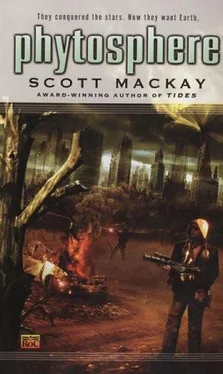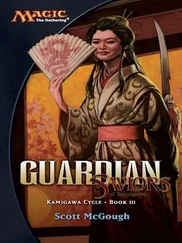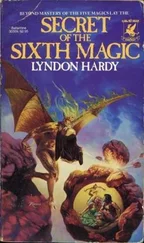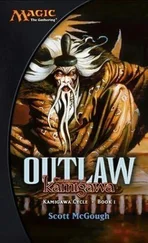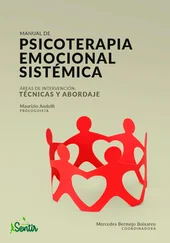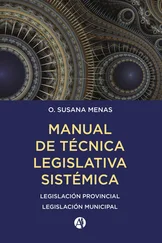“But you never went up, right?” said Jake.
“No.”
“Because you love Dad, right?”
“Yes.”
Jake motioned at the keys. “You think he might have food stashed in the cabin?”
“I don’t know. It doesn’t matter. I don’t know where it is.”
While they dug out the sixth and final crate, Buzz Fulton, the sheriff’s brother, drove by in his truck, the old junk heap bumping and rattling along the road. He slowed as he passed the house, and Glenda knew he could see what they were doing. He came to a brief stop as he passed in front of the house, but then continued into the hills, his vehicle looking lonely, as if it didn’t belong in the sunlit stillness of the dead woods.
“Mom?” said Hanna.
She watched Buzz go until he disappeared over the west hill. Then she looked down at the handgun.
Then at her son. “You want to learn how to use this, Jake?”
As Gerry and Ian rode the train out to the Alleyne-Parma Observatory to take their first look at the perforated phytosphere, Gerry held his fone tightly to his ear, even though he had just ended his call to Glenda. Miracle of miracles, they had at last gotten through to each other.
He took the fone away and looked at it, then put it in his pocket.
He went over his conversation with Glenda carefully, even as Ian gave him an apprehensive glance. That desperation in her voice. He had never heard her like that before. That bit about the stew, and how they were cooking it on a fire out back because Hanna wouldn’t eat it cold. And how Buzz Fulton had driven by a few times. Good old Buzz. He had shared more than a few drinks with Buzz. And the Cedarvale asthma medicine making Hanna high all the time. And Jake learning how to use a pistol. It was all so…unsettling.
A snippet of the conversation came full-blown to his mind.
“I’m working on a plan,” she had said.
“What kind of plan?”
“I’m going to disperse the food in the woods out back. And we’re going to run watches. Me and Jake.
Hanna’s too stoned from the medicine. If anybody gets too close to the house, that’s it, Gerry, I’m not asking any questions.”
In the shrillness of this last statement, Gerry had heard his wife’s true anxiety, her tone a revelation, her sentiment a measure of just how bad things had gotten. He stared at the bleak lunar landscape as they passed a spur line that led to an oxygen production facility—three great white spheres on the otherwise gray horizon. He understood—with chill finality—the jeopardy his wife and family faced. Armed men might come to the house and take their food away. Possibly kill them. And Glenda and Jake were going
to fight them with a rifle and a pistol, no questions asked. He had to find a way to beat the phytosphere and beat it fast.
He glanced at Ian.
“So?” said Ian.
“She’s not doing too good.” And he had to struggle to keep his emotions controlled.
“But she’s keeping it together, right?”
He thought of her plan. “In a manner of speaking.”
“Because I always knew she was a strong woman. Right from the moment I met her.”
“The neighbor got murdered.”
“Really? What happened?”
“He had a food stash. Some guys came to his house, killed him, and took it. He had an extra stash buried out behind his shed. That’s what Glenda and my kids are living on right now.”
Ian lifted his chin. “She’ll get through.”
Gerry swallowed against the growing lump in his throat. If he talked too much about this, he might lose it.
He decided to change the subject.
“I was in the mayor’s office this morning for an update.” He bolstered his voice with a businesslike tone.
“Neil’s toxin not only seems to be working, but the U.S. military and its allies have destroyed fully seventy-five percent of the Tarsalan killer satellites.”
Ian raised his brow. “So maybe ships will start getting through again. Maybe you’ll go home soon, buddy.”
Gerry felt himself getting shaky again because Ian was suggesting home. “They’re telling us to stay put. I think the military’s got something planned, Ian. Over and above the toxin thing. Something big.”
Ian shook his head. “You mean something stupid.”
They reached the observatory a short while later.
For Ian, it was an occasion to take a nip from his flask and light up a joint.
Gerry, on the other hand, went directly to Heaven’s Eye.
Rather than look at Earth on the monitors, he studied it through the telescope’s actual lens.
The terminator curved along the Earth’s meridian like a black fingernail, the planet in gibbous phase, looking like a partially closed green eye. At first he didn’t see any imperfections in the uniformly emerald pall, but soon, as the Earth rotated, he discerned an ill-defined black pupil. The muck of the phytosphere was a beryl pudding, and invisible fingers tore it apart. The ragged edges around the pupil had the whiteness of a plant that could no longer produce chlorophyll.
“Do you want a hit off this?” asked Ian.
“Take a look at this. See what you think.”
Gerry moved out of the way.
Holding the joint—a merry little smokable in pink paper—between his thumb and middle fingers, Ian leaned down and looked through the eyepiece. Gerry, meanwhile, considered what he had seen. He had to admit, it looked as if Neil was having some success.
Ian lifted his head. “Looks like it’s doing something.”
Gerry’s eyes narrowed. “Yeah.”
“You think it will work?”
“I hope so.”
“But?”
Gerry shrugged. “Maybe he’s got it.”
“But?”
It was indeed a piece of work that such a colossal structure could be dismantled this way, and he felt nothing but keen admiration for his brother.
“We’ll just have to wait.”
“Wait for what?” asked Ian.
“Seems like a slow process.”
“And?”
“The Tarsalans could respond.”
“Respond how?”
“With a neutralizer, or antidote, or some such other molecular or nanogenic agent. If you’re going to fight the Tarsalans, you have to be smarter, stronger, and sooner than they are.”
“Sooner?”
“You have to hit them all at once, like Stephanie says.”
Three technicians delivered infrared equipment to the Alleyne-Parma Observatory the following day.
Gerry was surprised, and also relieved. He had thought for sure that he wouldn’t get any of this new equipment until Neil’s toxin attempt had unequivocally failed. That he should see the equipment so soon made him think his arguments had, after all, carried weight, and that even the rhetorically minded Ira Levinson had at last seen reason.
The apparatus, in its entirety, was a boxy unit about the size of a refrigerator, and reminded Gerry of a giant multilens camera. One of the lenses stuck out further than the others, protruding from the white casing about six inches, while the other two lenses remained recessed into the instrument, covered with special optical filters made of blue glass.
The technicians took the whole afternoon to install the unit, and to download software into the accompanying computer.
When they were done, they gave Gerry a rundown, and by the time they left he was fairly adept at imaging, enhancing, and analyzing the infrared views of Earth.
The mayor came a few hours later. “How’s it working?” asked Hulke.
“You pulled some strings.”
“It was more than strings, Ger.”
“Malcolm… thanks.”
“Just do something with it. Give Ira a bone or something.”
“I’ve been studying the new images for the last few hours.”
“And so, like, your brother’s thing…is it working?”
Читать дальше
